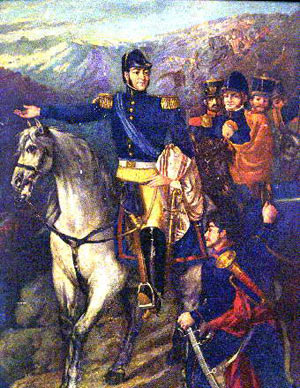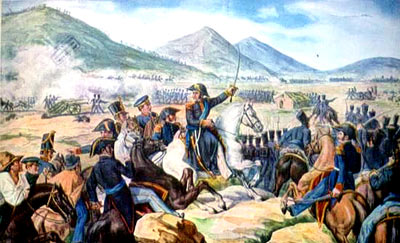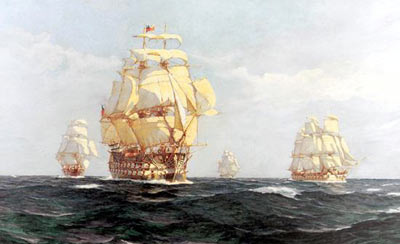|
Osorio's forces were highly superior. The patriot forces held
on for two days, until the royalists decided to set fire to
the city. O'Higgins desperately called for José Miguel Carrera's division, still north of
Rancagua. But
Carrera either betrayed O'Higgins or O'Higgins did not
understand the coded message Carrera sent him. From the bell
tower of
Rancagua's
church O'Higgins saw Carrera's division advancing and then
turning around and leaving. Carrera claimed that in the coded
message he had told O'Higgins to leave, and as he approached
the town he believed that he was leading his men to certain
death. O'Higgins maintained that Carrera had compromised his
forces by leaving.
Thousands of O'Higgins' men died that day. O'Higgins himself,
in one of the acts of bravery for which he was famous, pushed
forward with a few men and managed to escape.
What followed in
Santiago was
hellish. The patriots were defeated, the city ransacked, the
public treasury lost. Most of the men committed to the cause
of an independent Chile fled to Mendoza in Argentina. It was a
disastrous exodus through the snow on a virtually unpassable
track that even the mules found difficult to navigate.
O'Higgins and Carrera would never again speak to each other,
but would meet again in
Mendoza,
then under the command of José de San Martín.
Alliances: O'Higgins and José de San Martín
From their very first meeting, O'Higgins and San Martín found
in each other kindred spirits. O'Higgins was humble and
well-mannered, and had no problem in acknowledging San
Martín's authority on the eastern side of the
Andes, unlike
Carrera. Rivalries between the two Chilean factions came to a
head in Mendoza. Carrera managed to keep a small army and
stationed himself in a Mendoza neighbourhood. Carrera even
took some police in
Mendoza
prisoner when they arrived to investigate a raucous and
drunken 'meeting' between Chilean soldiers and beautiful
cuyanas.
O'Higgins, on the other hand, was considered by San Martín to
be the leader of the Chilean emigrés. The Argentine leader
took O'Higgins' side, believing that the defeat at
Rancagua was
Carrera's fault. Mendoza was now in danger. The Viceroy could
launch an attack on the United Provinces from Chile any
minute.
The United Provinces had been trying to secure their position
by attacking
Peru from
Bolivia, but had so far been unsuccessful. During 1815 and
part of 1816, the governor of Mendoza tried to convince the
authorities in Buenos Aires to organise the invasion of
Chile. It was
not an easy task and required something that had never been
done in terms of military logistics, making four thousand men
safely cross the Andes, properly dressed, armed and fed. It
was a monumental job, and a very expensive one. With Supreme
Director Pueyrredón in power in
Buenos Aires,
San Martín finally had real support. The expedition would
cross the Andes in the summer of 1817.
The expedition was successful. O'Higgins commanded two
battalions mostly formed by black slaves from Cuyo who would
earn their freedom if they survived the fighting. The Army of
the Andes crossed the mountains and on
17 February 1817, clashed with the royalists in Chacabuco, a few
kilometres north of
Santiago.
It was a clear victory, but O'Higgins charged when he was not
supposed to and compromised the whole operation. The royalist
forces fled Santiago and then disbanded. Some went to Lima,
some to Talcahuano. San Martín hesitated in pursuing them,
leaving the royalists able to win back strength in Talcahuano.
When San Martín declined the position of Supreme Director of
Chile, O'Higgins stepped into the fray. But soon he left
town and moved south to engage in war. O'Higgins attempted to
manage state affairs as best as he could. He stayed at
Concepción, which had been occupied by the Patriots, and
participated, in the midst of the rainy and cold winter, in
the siege of
Talcahuano
(as well as battling the Mapuche, who had allied themselves
with the royalists).
During most of 1817 and the beginning of 1818, O'Higgins' job
was waging war. He fought in the mornings and afternoons, then
went home to Concepción. There he met Rosario Puga, a
good-looking married woman, and they became lovers. The sexual
mores of the colonial era were gone, and the war made possible
this very unlikely union. Puga later bore Bernardo a son,
Demetrio. [4]
After a failed attempt to take
Talcahuano in
early December 1817, and facing the arrival of new royalist
troops from Lima and Spain, again commanded by Osorio,
O'Higgins, on the advice of San Martín, who had managed to
recover in Santiago, left Concepción. The strategy was one of
terra nullius: the whole town of Concepción was evacuated and
its inhabitants began a sorrowful journey towards Santiago.
Meanwhile, O'Higgins managed to move the Army to
Talca. There he engaged in a disastrous battle against
Osorio. At first, the Patriots were winning. Then they stayed
the night at a place called Cancharayada, but didn't suspect
that Osorio would counter-attack. O'Higgins almost died that
night - a bullet destroyed his right elbow.
There were rumours of a tragedy in
Santiago,
Mendoza and Buenos Aires. O'Higgins and San Martín were
presumed dead, and many Chileans began preparing for a change
of government. Then Manuel Rodríguez, Carrera's friend who
ironically had served as a guerrilla leader and a spy for San
Martín during the Spanish rule that followed Rancagua,
threatened to stage a Carrera-sponsored coup. His famous
cri-de-guerre 'Citizens: we still have a fatherland!'
motivated the depressed patriots in Santiago. All this was
more than O'Higgins could muster. On the verge of death, pale
and sick due to loss of blood, he left
San Fernando, where he was recovering, and in a hurried journey arrived
in
Santiago in less than two days. Exhausted, he got to the
presidential palace and almost fainted. Rodríguez' coup was
successfully quashed.
While O'Higgins was delirious, San Martín rallied a force of
4,000 to attack Osorio at Maipú. Now a
Santiago
suburb, Maipú was a war at Santiago's gates. The people began
hearing the canons on the morning of 5 April 1818. A feverish
O'Higgins heard them too. He instantly mounted his horse and
headed to the battlefield. When he arrived, the fight was over
and had been won by San Martín, and the two men embraced. It
had been a massacre for Osorio. Almost all of his 5,000 men
where either dead or captured. Spain would never again
organise such a force to attack
Chile.
Supreme
Director
Chilean independence was now complete, except for the
southern region.
Talcahuano,
Valdivia and Chiloé remained royalist strongholds. Bandits
roamed the countryside. O'Higgins tried to restore order and
give some sort of national presence to his government.
Although a theoretical democrat and admirer of the English
monarchy, he soon decided that the best form of government in
Chile at the time was a dictatorship. His dictatorship.
Tired of so many wars, most Chileans supported O'Higgins, and
Carrera's support base disappeared. Two Carrera brothers, Luis
and Juan José, who were held captive in
Mendoza after
they tried to sneak into Chile to overthrow O'Higgins while he
was waging war in the south, were tried and executed.
O'Higgins always claimed that he had pardoned the two men, but
that the letter of clemency had arrived in Mendoza just hours
after the Carreras died. Then Manuel Rodríguez, who had been
offered a position in a foreign embassy but refused, was shot
dead near
Santiago.
O'Higgins again claimed that he had no responsibility for the
killing, which had been carried out by soldiers, but never
fully managed to prove that he had not given the order.
At the beginning of his administration, the Lautaro Lodge, a
clandestine Argentine pro-independence organisation to which
O'Higgins had been affiliated in
Mendoza,
had some influence. Then internal quarrels among the
'brothers' led to its dissolution.
O'Higgins greatest obsession was the building of a fleet that
would sail to
Peru and
depose Viceroy Pezuela. However,
Buenos Aires was in anarchy and therefore no more money would be
forthcoming in the wake of the battle of Maipú. Moreover, San
Martín had been ordered to return to
Buenos Aires
and fight in the civil war. He refused and instead stayed in
Chile and began preparing the invasion of
Peru.
O'Higgins decided that securing Chilean independence was more
important than rebuilding the country, and understood that the
existence of a Viceroy in Lima made matters uncertain
O'Higgins took out a British loan that seriously compromised
Chile's finances and finally got together a force of
twenty-five vessels commanded by Lord Thomas Cochrane, a
British officer who had proven himself in the eyes of the
Supreme Director by taking Valdivia, a Spanish stronghold in
Southern Chile, some months before. Cochrane would sail to
Peru
and San Martín would command the troops in combat. The naval
expedition sailed from Valparaíso on 20 August 1820,
O'Higgins' forty-second birthday.
Meanwhile O'Higgins founded the
Military
Academy, the Naval School, a public market for Santiago, and
instigated important developments in agricultural
infrastructure. At the same time, he fought fiercely against
Santiago's
aristocracy and church, particularly on the issue of taxes.
Santiago's archbishop was exiled.
O'Higgins had few close friends and most of the time he took
refuge in the patio of the government house where he had a
green parrot whom he used as a confessor. In 1821 his nemesis
José Miguel Carrera, who had fought with the federal forces in
Argentina's civil war, formed a gang of Chilean soldiers and
indigenous peoples and began stealing from the estancias
in Argentina. He was eventually caught in Mendoza and shot.
O'Higgins was not directly responsible, but did not spare
Carrera's life.
Rosario Puga had been acting as Bernardo's wife while still
legally married to another man. The relationship did not
prosper and
Rosario was
soon engaged to a supporter of Carrera and became pregnant.
During all this time, O'Higgins' family was his mother Isabel
and his half-sister Rosa, who lived with him in the government
palace. Isabel and Rosa became social figures in the small
Santiago world - Rosa was a of patron of the arts, and engaged
in the financing and production of many plays. When Puga left
O'Higgins, she took away Bernardo's son Demetrio.
Problems with the aristocracy, the church, the Carrerians and
the virtual bankruptcy of the government were exacerbated by
an earthquake in 1822 and a controversial autocratic
constitution passed by O'Higgins that same year. Ramón Freire,
formerly his closest ally, suddenly rallied the
province of
Concepción against O'Higgins. Soon the province of Coquimbo
followed. With civil war pending, O'Higgins resigned from
government in January 1823 and departed for Peru with his
family.
Exile
and Breakdown
As O'Higgins had informed Bolívar's guests at the banquet,
after 1824 he had become a farmer, but was not very
successful. He kept in touch with some friends, but his dreams
of a political comeback were impossible to achieve. After
briefly courting Mariscal Andrés de
Santa Cruz,
the ambitious Bolivian general who created the
Peruvian-Bolivian confederacy and then went to war against
Chile, O'Higgins descended into anonymity.
In 1842 he was finally re-installed in the Chilean rank of
officer and was given permission to return. While Bernardo
O'Higgins was preparing to board the ship, he fell seriously
ill and died in October 1842.
His body was not brought back to
Chile until
1869. His soul probably still haunts the Chilean countryside
were he gave the best part of his life among the mud, horses
and blood of so many battles.
Alfredo Sepúlveda
Notes
[1] Un bravo general
como usted,
temido de los enemigos y experimentado entre nuestros
oficiales y jefes, no puede menos que dar un nuevo grado de
aprecio a nuestro ejército… Ofrezco a usted un mando… propio a
distinguir a cualquier jefe que quiera señalarse en un campo
de gloria, porque un cuerpo de
Colombia
a las órdenes de usted debe contar con la victoria.
[2] El
general O'Higgins era bravo hasta el extremo, pero sus
conocimientos militares eran nulos.
[3] Señor, la
América está libre. Desde hoy el general O'Higgins ya no
existe; soy sólo el ciudadano particular Bernardo O'Higgins.
Después de Ayacucho mi misión está concluida.
[4] According to Pamela Pequeño's documentary La hija de
O'Higgins (2001), Bernardo O'Higgins had a daughter,
Petronila, by Patricia Rodríguez, his mother's nanny. As
Ambrosio had done to him, Bernardo O'Higgins never
acknowledged any of his children.
References
- Amunátegui, Miguel Luis, La dictadura de O'Higgins (Madrid:
América, 18?).
- Barros Arana, Diego, Historia General de Chile
(Santiago de Chile: Rafael Jover, Vols. 8-12, 1884-1902).
- Carrera, José Miguel, Diario Militar (Santiago de
Chile: Imprenta Cervantes, 1900).
- De Breffny, Brian, 'Ambrose O'Higgins: An enquiry into
his origins and ancestry' in The Irish Ancestor 2:2
(1970), pp. 81-89.
- De la Cruz, José María et al., Recuerdos de don
Bernardo O'Higgins (Santiago de Chile: Andrés Bello,
1960).
- Donoso, Ricardo, El marqués de Osorno don Ambrosio
Higgins (Santiago de Chile: Publicaciones de la
Universidad de Chile, 1945).
- Eyzaguirre, Jaime, O'Higgins (Santiago de Chile:
Zig-Zag, 1965).
- Hughes, Noel, Bernardo O'Higgins - In
Richmond? (London:
Richmond History, no. 18, 1997).
- León, Leonardo, Reclutas forzados y desertores de la
patria: El bajo pueblo chileno en la guerra de la
independencia in 'Historia' (Santiago de Chile), 35
(2002), pp. 251-297.
- Ruiz Moreno, Isidoro J., Campañas militares
argentinas. La política y la guerra (Buenos Aires:
Emecé, 2005).
- Twinam, Ann, Public lives, Private secrets.
Gender, Honor, Sexuality, and
Illegitimacy in Colonial
Spanish America
(Palo Alto: Stanford University Press, 1999).
- Valencia Avaria, Luis, O'Higgins, el buen genio de
América (Santiago de Chile: Universitaria, 1980).
- Vicuña
Mackenna, Benjamín, El Ostracismo
del
jeneral don Bernardo O'Higgins
(Valparaíso: Imprenta y Librería de El Mercurio, 1860). |




